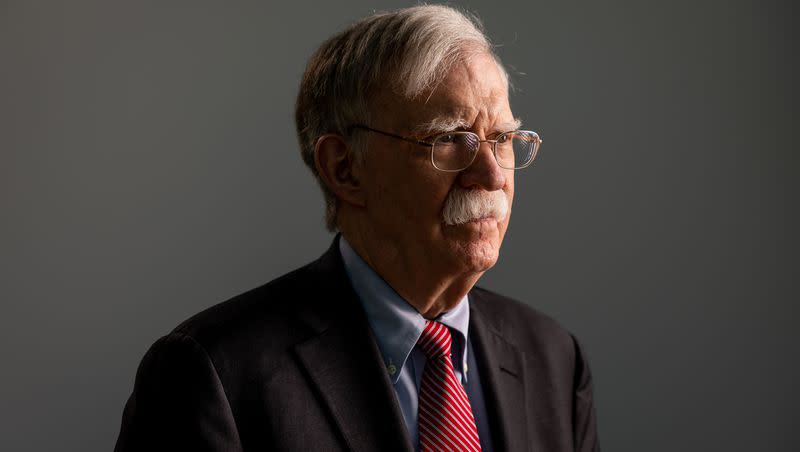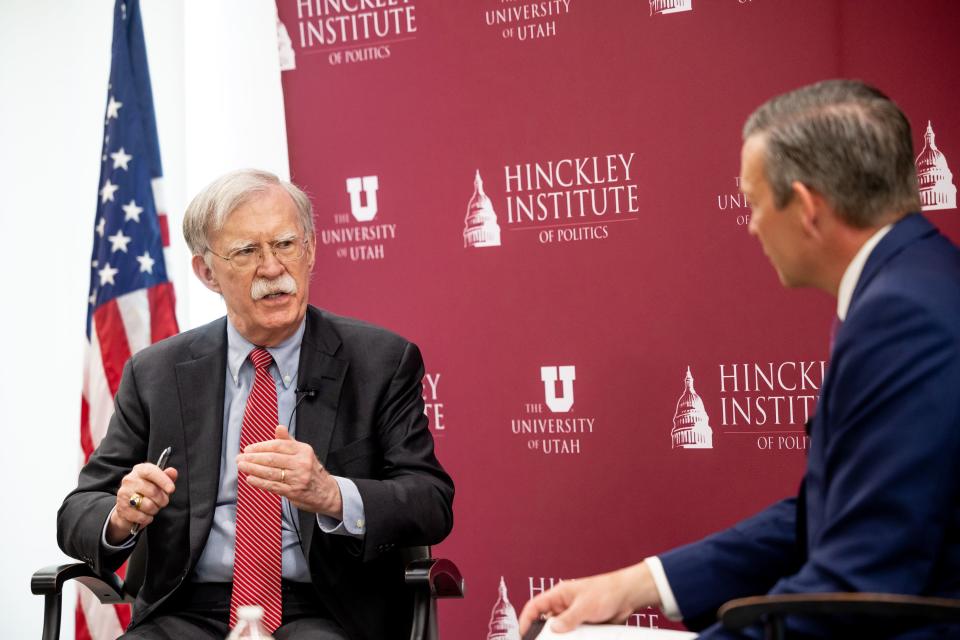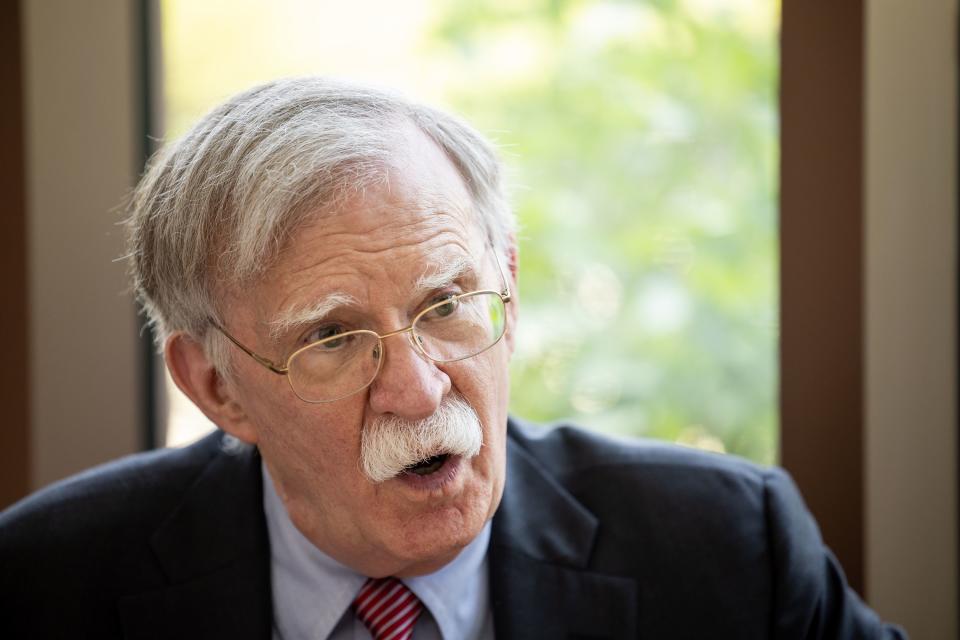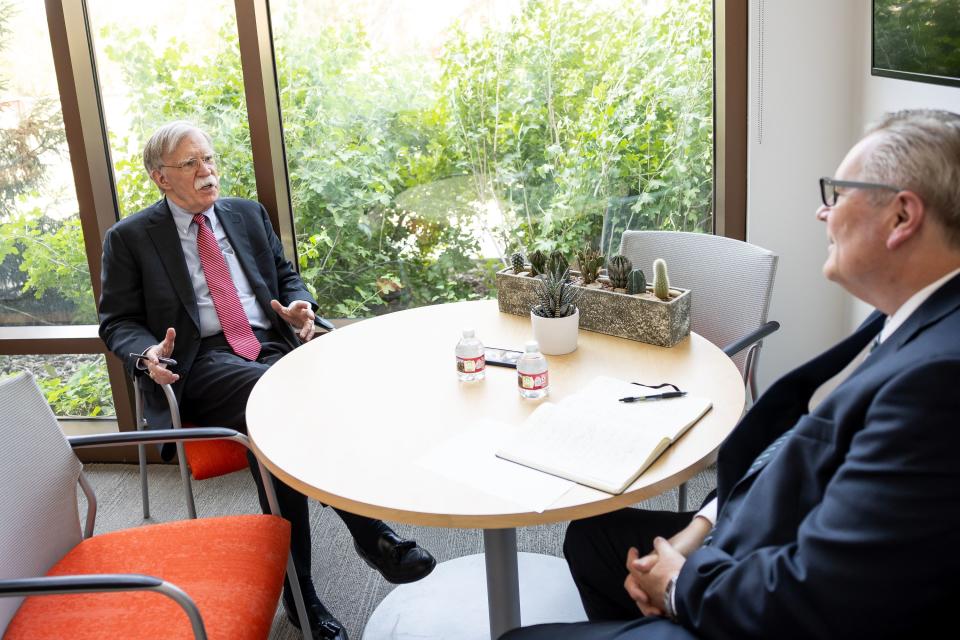Former national security adviser John Bolton is asked a question: Are we safe?

- Oops!Something went wrong.Please try again later.
Former national security adviser John Bolton came to Utah this week and was asked to assess the greatest risks to national security.
His answer came quickly: The strategic threats to the global West are China and Russia. He then reeled off “more medium level” threats of international terrorism, with proliferate nuclear, chemical and biological weapons. “So North Korea, Iran on the weapons of mass destruction threat, the return of foreign terrorist fighters to Afghanistan, which is proceeding at a rapid rate, terrorism and a range of other issues.”
He assessed the threats on two separate timelines, the immediate threats and the strategic or long-term threats.
“Although we focus with good reason on the ongoing war in Ukraine, the largest land war in Europe since World War II, what’s happening beyond that is really, ultimately, more important,” he said.
Bolton came to Utah at the invitation of World Trade Center Utah and spent part of his visit this week in conversation with Jason Perry, vice president for government relations and the director of the Hinckley Institute of Politics at the University of Utah, and later in an exclusive interview with the Deseret News. Bolton noted the unique moment the nation currently finds itself in both internationally and domestically:
“I think a shift in history is going on here. Sometimes history (moves) really quickly. Sometimes it has been going slowly. ... Right now we’re moving very fast, and the post cold war era is over,” he said before students at the Hinckley Institute of Politics.

In a wide-ranging interview with the Deseret News, Bolton, whose decades-long resume also includes appointment as ambassador to the United Nations under President George W. Bush, undersecretary of state for Arms Control and International Security, in addition to stints with the state department and with the department of Justice, discusses foreign affairs, makes a defense of deposing Saddam Hussein, and offers his view on what the nation needs to see from candidates running for president.
This interview has been lightly edited for length and content.
Deseret News: You discussed the threats to America. So are we safe?
John Bolton: Well, we’re pretty safe. But we have not spent adequately on defense for a long, long time. At the end of the Cold War, people talked about the end of history. And remember the peace dividend, where everybody cut their defense expenditures dramatically. And we’re still suffering from that even after 911. We didn’t gear up adequately. And after eight years of (President Barack) Obama, we were really in difficult shape, (President Donald) Trump increased some expenditures. But the level of threat we’re facing, I think, requires us to go back to Reagan-era levels of defense spending of 5% to 6% of GDP, and we are now a little bit over 3%.
DN: There is debate about the level of military support the United States should be giving Ukraine. Is there a threshold there that makes sense?
JB: This is a good example of how (President Joe Biden) has really made a mess of this thing. They have not had a strategy to win in Ukraine. They had a strategy in the early days of getting (President Volodymyr) Zelenskyy out of Kyiv and staying behind the guerrilla fighters because they expected the Russians to win. And obviously, that didn’t happen. And they’ve never developed a new strategy. And it’s not hard. The strategy is, stating your objectives, and then assembling the resources you need to achieve the objective. We say our position is we want restoration of the full sovereignty and territorial integrity of Ukraine. But if that’s our position, if that really is our position, we’re not doing what you need to do it and you don’t put weapons systems in one at a time and think that’s a strategy.
DN: So what would you do today?
JB: Well, I think, now we’re at a point where this spring offensive is going to happen or not happen. But what I’m worried about, and I think what we need to be responding to, is if Putin can keep the military situation gridlocked. He thinks that the Europeans, the Germans, and the French in particular, and maybe us will lose our willpower, lose our resolve, and that he can win diplomatically when he can’t win militarily now. So I think we have to be very clear that we’re not looking to negotiate.

DN: Let me turn to domestic issues. How do you assess the state of the nation right now?
JB: Well, I think it’s very divided politically, partisan. Antipathy is high. There’s no doubt about it, which is why I said in there, I think the candidate who has the positive message, not necessarily about the other candidates, because negative ads are what they are. But the positive message that we’ve got a bright future. I think people are waiting for somebody not just to say it, but somebody that they think can actually make it happen.
DN: You’ve written about President Trump. What’s your assessment of his chances in the future?
JB: Well, he’s had a couple of good months. There’s no doubt about it. He leads in the polls, But I don’t think he’s got the nomination clinched by any imagination. You saw what happened in Iowa last weekend. (Gov. Ron) DeSantis had a good weekend. Trump wasn’t raising a good crowd, so he canceled his rally (claiming it was) because of a tornado warning. DeSantis, showing real agility, got a bunch of people to a barbecue joint and you know, the sky was clear. The rest of the country may not notice that. But in Iowa where nominating a president is a cottage industry, they noticed it. … There’s a long way to go.
DN: You gave an assessment of the Biden administration’s foreign response. From your perspective, how has he done domestically?
JB: Well, I think he’s spent us into a very powerless economic circumstance. I mean, this modern monetary theory that you don’t have to worry about inflation, you can spend as much as you want, obviously is proven wrong, it’s forced the Fed to increase interest rates, which they should have done a long time ago. We’ve got to get the national debt down. We’ve got to get federal spending down. We do have to raise defense expenditures, which means domestic expenditures are going to have to come down even more. That’s just a fact. The presidential candidate who’s willing to say and do that is the one who’s telling the truth.
DN: So I’m trying to assess whether you think America is in a good place or a scary place. Do you have cause for optimism about the future?
JB: I’m optimistic. But I think we’re our own worst enemies. Nobody’s going to beat us. We’re going to beat ourselves if that’s what happens. And you know, this constant running down of America by Trump reminds me of liberal Democrats. That’s what they do all the time. Everybody’s a victim. Everybody’s oppressed. Things are just terrible. We need the government to save us. The only difference is Trump says we need Donald Trump to save us. And I think they’re both wrong. … I’m not saying there aren’t problems to be overcome. Of course there are. But the question is, what is your attitude about the potential that the country brings to the table when it confronts these kinds of issues? I wouldn’t want to be anywhere else.
DN: So what are three main reasons to be optimistic about the future of America?
JB: Well, America is still where creativity and ingenuity can succeed, and where you get rewarded for it. We still have the capability to be an example for the rest of the world. It’s much more compelling than anywhere else. And this is still the country in the world, people are beating down the doors to get in.
DN: Elon Musk has said that he’s seen a lot of technologies and none poses as much “risk” as artificial intelligence, or AI. He said it is a greater risk than nuclear weapons. Do you agree with that assessment?
JB: You know, I just think AI covers everything. … You talk about changing images and things like that, that’s called photoshopping. You don’t need a computer to change things like that. So if you call everything AI, then yeah, OK. it’s a problem. I mean, what a lot of this is simply aggregating and analyzing data far more quickly than the human brain can do it or more comprehensively. It doesn’t mean it’s creative. Doesn’t mean it’s doing anything new. I’m not saying it’s not a problem. I’m saying I want a better definition of what the threat is. I know what the threat of a nuclear weapon is. We we’ve seen what they do, and tell me exactly what the threat is here?
DN: You’ve been involved with government at the highest levels. At the Deseret News we’ve looked at the threat to social structures like family, faith, church and community. How do you see the interaction between what the government can do and what those social institutions can do?
JB: Well, I think when social institutions are under attack, they try and defend themselves. And the role of leaders at the top of society, if they think the social structures are beneficial, they should defend them. If they think they need to be reformed, they should reform them. I mean, the institution of slavery was a very powerful institution, but we had to get rid of it. It was the moral and right thing to do. So it doesn’t mean the leaders always have to defend the institution. But we’ve got a lot of leaders who I think sympathize with those who want to weaken them.
DN: Does faith play a role in government. Do you see people of faith in government?
JB: Well, I think inevitably it plays a part in civic life. And where it’s weakened, I think the country gets in more trouble more quickly.
DW: So what keeps you awake at night?
JB: I sleep. If I stayed awake worrying about everything I wouldn’t get any sleep.
DW: As you look at your long career can you point to something where you say, well, we really survived something there? Or we really made a difference there?
JB: Well, I think, you know, probably in the first Persian Gulf War, when I worked for George H.W. Bush and Jim Baker getting the Security Council to endorse the use of force to throw Saddam Hussein out. Repealing the Zionism is racism resolution, the General Assembly in 1991. What was happening in those years was really tectonic. So those were significant times. But I think probably most important in the Trump administration was, along with a lot of other people, keeping the ship afloat.
DN: Did you feel like you were doing that in the Trump administration?
JB: I felt like every day I was glad it was over. Because we were still going ahead.
DN: You mentioned deposing Saddam Hussein. Much has been written about weapons of mass destruction and some of the misinformation that was there; the weapons didn’t materialize. So what did we learn from that? Were there mistakes made? Where are we as a result of that?
JB: Well, I think we got rid of the regime that was pursuing weapons of mass destruction, and that was the most important thing. I think, perhaps we didn’t explain enough at the time about what we were going after. Take nuclear weapons. I didn’t think at the time that there were centrifuges spinning, or weapons being produced, because that was one thing we had destroyed after the first Gulf War, when we had vastly underestimated how far along Saddam Hussein was. The IAEA was stunned at how close they were. But we destroyed all that. … Well, what we didn’t destroy were the 3,000 scientists and technicians that Saddam kept together — called them his nuclear Mujahideen — these were the 3,000 people who once the U.N. weapons inspectors were gone, once the sanctions had been removed, would have created his nuclear weapons program, because they had it up here. And you know, it was that threat. It wasn’t that it was a threat, the minute we invaded, it was the threat that was coming. And it was part of, I think, our failure to explain more broadly, why preventative or preemptive military action, in an age of weapons of mass destruction, is fully justified.


